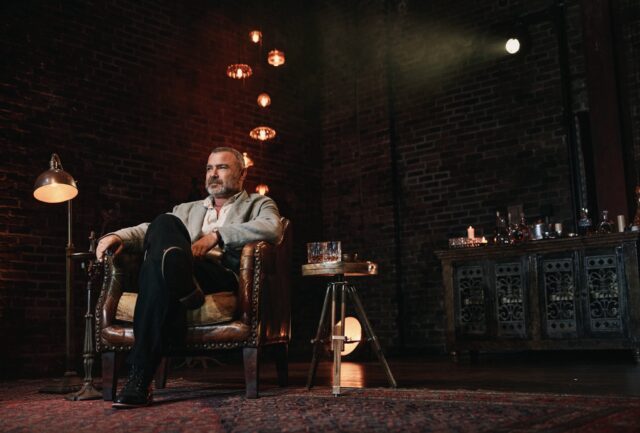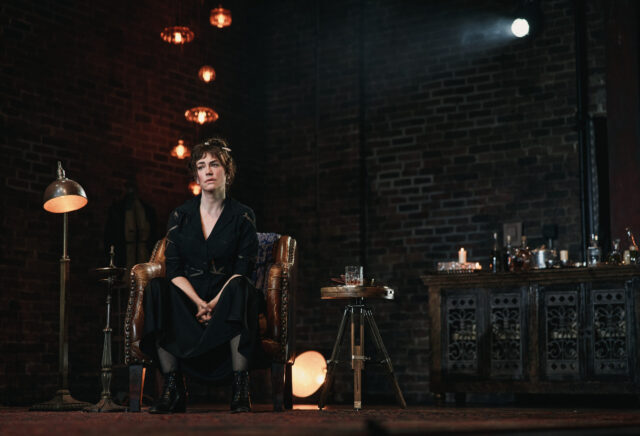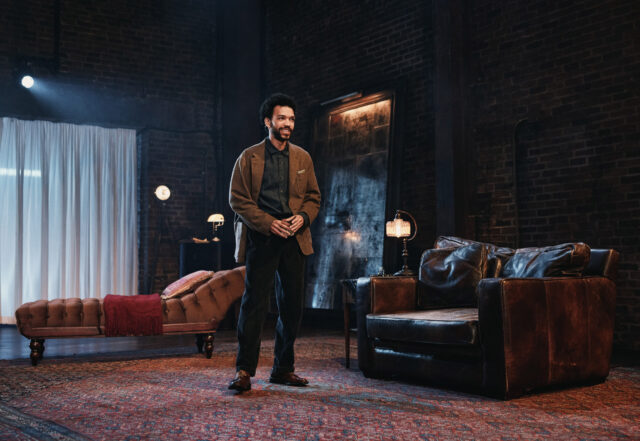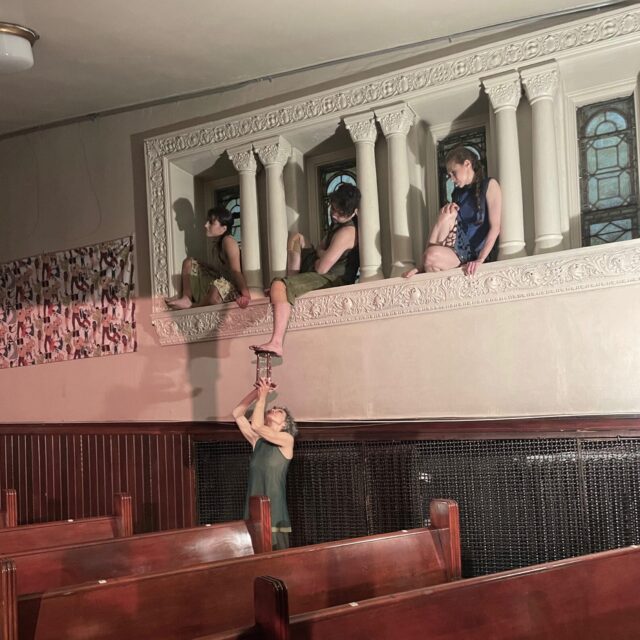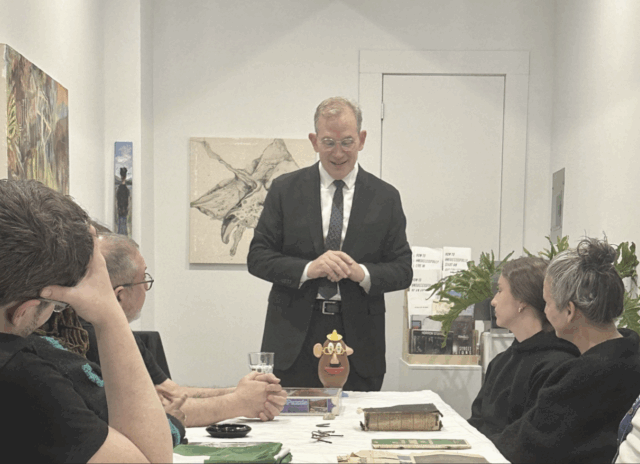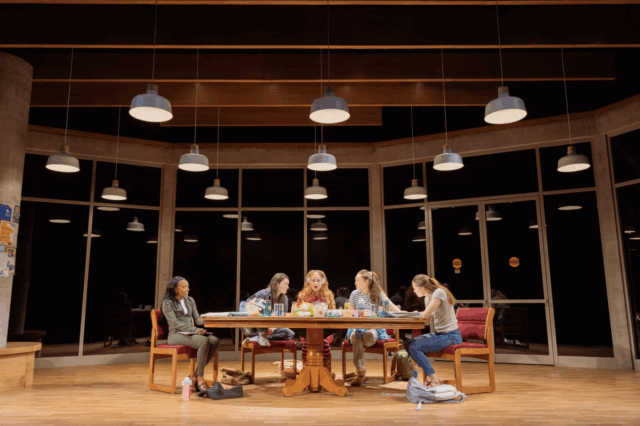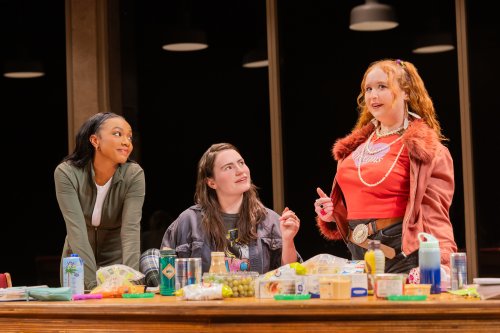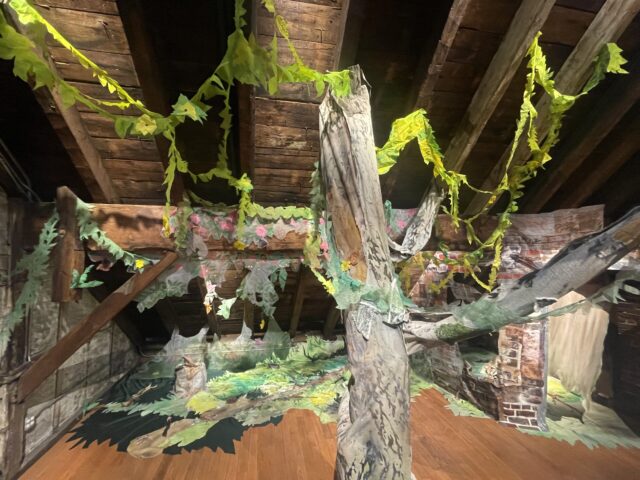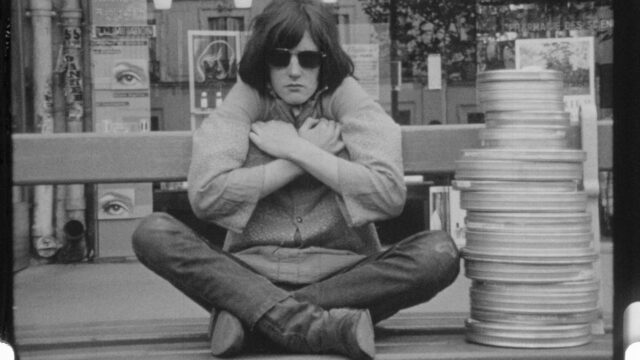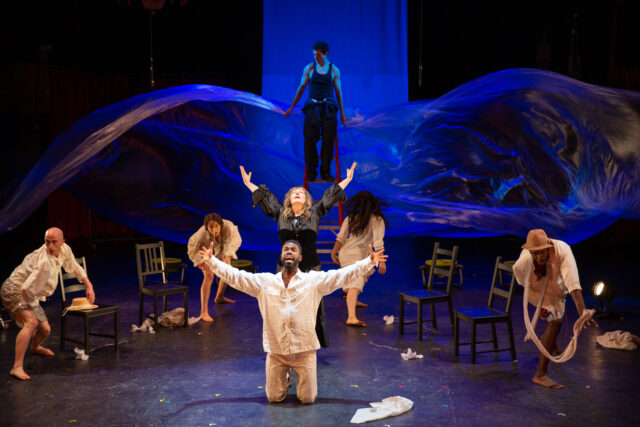
Alexander Molochnikov’s Seagull: True Story keeps flapping its wings at La MaMa through June 1 (photo by Frederick Charles)
SEAGULL: TRUE STORY
La MaMa Experimental Theatre Club
The Ellen Stewart Theatre
66 East Fourth St. between Second Ave. & Bowery
Wednesday – Sunday through June 1, $40-$45
212-475-7710
www.lamama.org
In Anton Chekhov’s 1896 tragicomedy The Seagull, wannabe playwright and director Konstantin Gavrilovich Treplev says, “It’s not about old or new forms, but about the fact that what a person writes, not thinking about forms at all, they write because it flies freely from their soul!” The line is at the center of the world premiere of Alexander “Sasha” Molochnikov’s Seagull: True Story, continuing at La MaMa through June 1.
In 2022, Molochnikov was a successful Russian director who had staged works at the Moscow Art Theater and won the prestigious Golden Mask award for his production of The Seagull at the Bolshoi. He was starting to make a film when Russia started bombing Ukraine; he soon spoke out against the attack. He then found himself a target of Vladimir Putin’s administration and departed for America with not much more than the clothes on his back.
“The pressure on artists, comedians, and especially directors has been ruthless in Russia. As a result, a dozen or so of the most celebrated theater directors working in Moscow before the war have left the country,” he wrote in Rolling Stone in November 2022. “Now any performance has to be careful so as not to offend the Kremlin’s feelings. Those who were not ready to cave in and play that game chose to give up their opportunities, resources, stages, and salaries and run. They escaped Russia to foreign countries, counting only on their own talents and starting over from scratch. My case was the latest in a chain of attacks on the arts and free speech in Russia. . . . There is only one reason so many artists have left: It’s unsafe and dangerous to express a negative opinion of what Russian authorities call ‘a special operation’ and what the world calls an invasion.”
In Seagull: True Story, Molochnikov and writer Eli Rarey adapt Sasha’s real tale into a kind of theatrical fantasy rooted in Chekhov’s play, complete with a play-within-a-play, a love triangle, a complicated mother-son relationship, a gun, and discussions of form and freedom. Andrey Burkovskiy serves as the emcee for the evening, addressing the crowd directly while also playing several other key roles.
It’s February 2022, and young director Kon (Eric Tabach) is leading the rehearsal for his wildly inventive adaptation of The Seagull at the prestigious Moscow Art Theater, which was founded by Konstantin Stanislavski and Vladimir Nemirovich-Danchenko in 1898. The MC succinctly sums up Chekhov’s plot: “Basically nothing happens. Treplev is a director in love with Nina, an actress. His mom is an actress too. Nina is in love with someone else. She leaves, Treplev is sad, she comes back, Treplev is even more sad. His mom is a bitch. He shoots himself. That’s it.”
Kon’s mother, Olga (Zuzanna Szadkowski), is a famous Russian actress who is playing Arkadina. Ivan (Quentin Lee Moore) is Treplev, her hapless son who is in love with Nina, portrayed by Nico (Stella Baker). Poet and playwright Anton (Elan Zafir) is the dramaturg, while Yuri (Burkovskiy), the theater manager, keeps a close eye on everything. Alexander Shishkin’s set features two dressing tables on either side of the stage, in front of the red curtain, and a deep open space behind it where the rehearsals are held; many of the props involve creative uses of plastic, from flags to ocean waves to bedspreads.
In a rare compliment, Olga tells Kon, “If Chekhov were here today, he would be happy to see that his play lives on in your hands.”
However, once Russia starts bombing Ukraine, the actors start fighting — Ivan, defending the Kremlin, gets into it with Masha and Dmitri, who support Ukraine — and Yuri explains that the show can go on only if he agrees to make certain cuts, including the essential freedom dance, and signs a loyalty oath. But when Kon makes a private anti-Putin video that goes viral, he has to consider getting out of the country immediately, leaving his mother and his good friend Anton behind.
In the second act, Kon arrives virtually penniless in New York, with nowhere to live. He meets aspiring actress Nico (Stella Baker) on the subway and asks his mother’s old friend Barry (Burkovskiy), a producer, for help bringing his adaptation of The Seagull to the city.
“A love story! Just like in The Seagull. Incredible coincidence,” the MC declares. “Everything is going to be fantastic for Kon in America! . . . Right?”
Not necessarily.
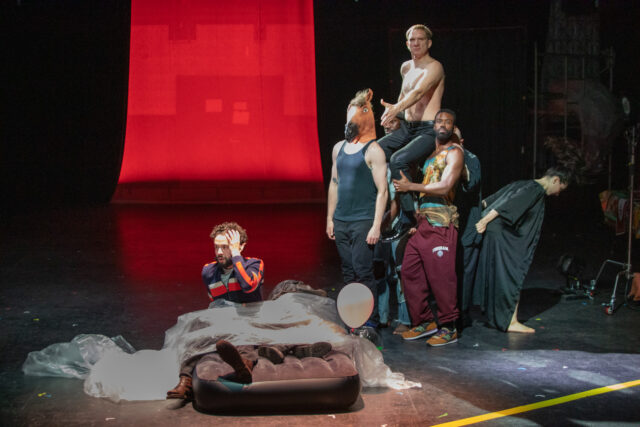
Vladimir Putin (Andrey Burkovskiy) trots into Kon’s (Eric Tabach) nightmare in Seagull: True Story (photo by Frederick Charles)
A coproduction of Sofia Kapkov’s MART Foundation and Anne Hamburger’s En Garde Arts, Seagull: True Story is one of a number of recent shows from companies led by Russian or Ukrainian refugees, including Igor Golyak and Arlekin Players Theatre’s The Merchant of Venice and Our Class, Dmitry Krymov and Krimov Lab NYC’s Pushkin “Eugene Onegin” and Big Trip, and director Eduard Tolokonnikov and producer Polina Belkina’s encore engagement of Aleksandr Volodin’s Five Evenings.
The works bring an exhilarating aesthetic to independent New York City theater; Golyak and Krymov have brilliantly wild and unpredictable methods of storytelling where almost anything can happen, incorporating lunatic props and unique interactive elements. There’s a palpable sense of excitement to these productions in New York these days: Among the opening-night audience members ready for anything were Golyak, Krymov, American actor Gus Birney, Belgian actor and producer Ronald Guttman, and the Latvian-born Mikhail Baryshnikov, who defected from Russia to Canada in 1974 and became a US citizen in 1986.
The exuberant cast of Seagull: True Story sing, dance, and march while switching between the play and the play-within-the-play. Certain lines of dialogue are accompanied by winks and nods as they relate just as much to what is happening in the United States under the current administration as to the events occurring in Russia and Ukraine. The first act is sensational, a fast and furious celebration of the power of theater even under the most stressful and dangerous situations. The second act is decidedly slower and more didactic, with repetitive subplots as the focus narrows; it could use a bit more shaping.
(As a side note, I was also hoping to find out how to properly pronounce Moscow — is it Mos-cow like the animal or Mos-koh? I’ve always gone with the latter, since I once read that Walter Cronkite declared, “There is no cow in Moscow” — but different actors say it different ways, without any rhyme or reason that I could make out.)
At the beginning of the show, the MC says the word “fantastic” ten times, praising himself, the audience, and the play. He announces, “Don’t panic, you will be arrested only at the end of the show. No, no, I’m joking. Am I? Of course not. Everything is fantastic. Everyone is safe here.” Burkovskiy is fantastic in his multiple roles, his tongue firmly in his cheek as he offers his own spin on the MC from Cabaret. Zafir poignantly portrays the friendly and likable Anton, Baker excels as the ambitious and sexy Nico, and Tabach ably stands in for Molochnikov as he faces a frightening reality and has to start all over again.
“The world loves Russian theater. It has survived under Josef Stalin, Nikita Khrushchev, and Leonid Brezhnev. It will outlive Putin, too,” Molochnikov concludes in his Rolling Stone essay. “But the life we had before the war is over. Russian theater is universal. The pain in the works of Chekhov, Nikolai Gogol, Fyodor Dostoevsky, and Leo Tolstoy are understood and appreciated all over the world. I will work on my dramas, operas, and ballets abroad. ‘We will work,’ as Sonya says in Uncle Vanya. We will ‘look for new forms,’ as Treplev says in The Seagull. The theater will live on.”
Russia’s loss is New York City’s gain.
[Mark Rifkin is a Brooklyn-born, Manhattan-based writer and editor; you can follow him on Substack here.]
